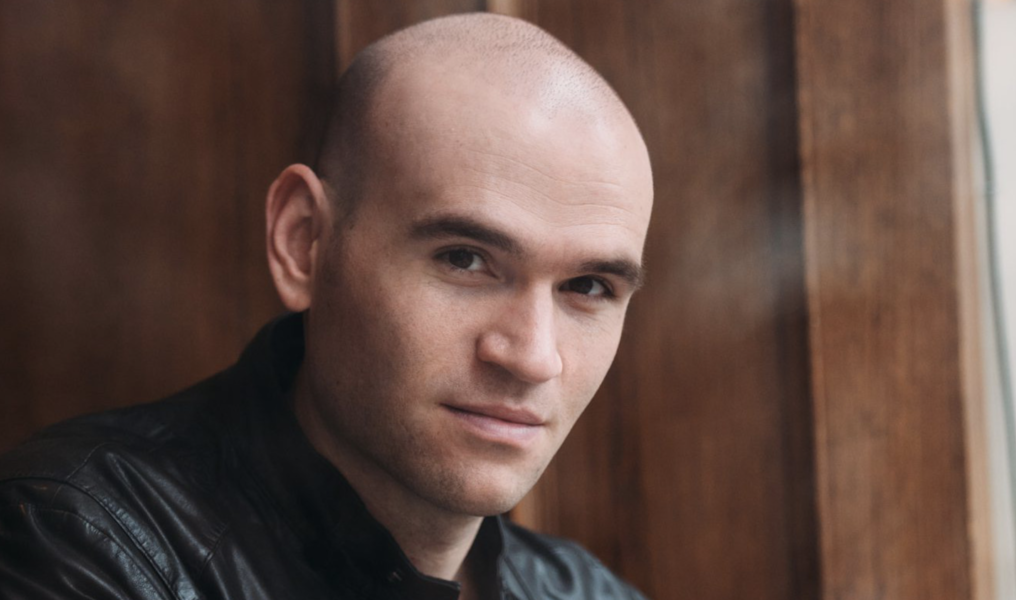Michael Fabiano's approach to his opera career has served him well. Described by The Independent as "out of this world" and The New York Times as "one of the most exciting, sought after singers in the world," those following opera today will likely have heard of the rising tenor. He made a splash at just 22 years old when he beat out thousands of other hopefuls at the Metropolitan Opera National Council Auditions in 2007. That same year, he had his stage debut at the Klagenfurt Stadttheater as Alfredo in "La Traviata."
It's evident that his reputation as a risk-taker has been as rewarding as it has been well-earned. The University of Michigan School of Music grad has logged performances across the globe in such famed venues as Carnegie Hall, Opéra National de Paris and Teatro di San Carlo. Even in his spare time Fabiano favors the bold, having earned his pilot's license. Now, the jet-setting singer will appear at the Michigan Opera Theatre on Oct. 12 for An Evening With Michael Fabiano. In advance of the performance, the openly gay star caught up with Between The Lines to talk about his current projects and his thoughts on portraying an openly LGBTQ character.
A necessity for a successful opera singer is confidence and stage presence. You've mentioned before that you attribute your high school debate team as having fostered that in you.
Absolutely. I always reference debate and sometimes people are confused by it, but the reality is that debate really gave me the skills to stand in front of lots of people, speak with my full voice, speak about matters of politics, life — whatever it was — and, by the way, be able to step into the shoes of both sides of an issue. To really be able see things from multiple perspectives. I would debate topics about the morality of authoritarian government and if it was preferable to the opposite and I'd have to be able to argue both sides of that coin in various rounds. Not because I wanted to, but because that's the way the set up was. That's what provides empathy and perspective. And a great artist is a person that's empathic, but even more than that is a person that is capable of multiple layers of expression.
Right, if you're portraying a villainous person, for instance, they might not see themselves in that way, even if the audience might.
Macbeth is a villain, maybe not. It's an argument that one could make.
You were raised in a musical family and got introduced to the art form young, but you've mentioned before that it's often "otherized" by people who associate it with elitist stereotypes. Could you elaborate on that point?
The biggest problem that opera has right now is its messaging. We message, or the opera world generally messages, that opera is for people that have money — as I call champagne socialists or rich conservatives, one of the two. And I'm not marginalizing those people, both of them are important, both the conservatives and the socialists, but opera is for everybody. When Verdi wrote his works, he wrote it for the large swath of people that had no money, nothing, couldn't pay anything. And one can go to the opera today for $20; it can cost people $150 to go to a Knicks game in New York City or a Giants game. And that's all I have to say, that we're in a stage now where we have to be doing a better job of our message and we're not doing that.
Is that where co-founding ArtSmart comes in?
So, ArtSmart is an organization that creates a framework for children to get free vocal instruction on a weekly basis that concurrently allows those kids to have the opportunity at a greater musical experience than they have at school. We introduce them to opera and classical music events, we do it in a very specialized way and it's growing aggressively.
Speaking of growth, in your career you've made a name for yourself as a risk-taker, as someone unafraid to step forward out of his comfort zone. How do you go about choosing your next career moves?
I would say the phrase that I used the most is calculated risk-taking. Risks are items that can cause distress, duress or despair from the individual if the action doesn't take off but can yield a great reward if it does. And so, what I do is I look at all items that could cause me distress but, more potentially, could lead me to success, and I calculate the odds of that success ratio, literally. I really break it down to numbers and then I act. It's as simple as that. And it sounds more convoluted than it is, but it's literally AP statistics.
What's a role that you'd be interested in taking on that is completely new to you?
Andrea Chenier. It's a calculated risk because it comes with the public perception that I'm a different type of tenor than I am now, and so it has the expectation that I will deliver a certain type of voice, even though I'm confident that I have that kind of voice at this point.
More than ever LGBTQ themes are being represented in opera. Would you be open to portraying an LGBTQ character?
I believe in the intention of the libretto and what's on the page. So, works that have existed, I will do as they exist. I'm not interested in throwing green paint on a Picasso and saying that it's new; I'm interested in doing the work as it is. I'm pretty constructionist when it comes to opera. If you're doing "La Boheme" you do "La Boheme," if you're singing "Traviata," you do "Traviata," you know? We don't change the story for the sake of new social implications. I think that, first of all, it's confusing to the public. It might be interesting for certain groups of people, but [for] the public at large it's trickier to sell. And we have to not just be thinking about small groups of people at the time, we have to think about critical mass, and are we moving the needle for everybody? So, that leads me to the second answer, which is: if there were a work that was created that featured a role where I could be a character that struggled with sexuality or was gay or that was something new, of course I would do it. Absolutely. That's a given. I would never say no to that.
Have you been offered newly written work as an LGBTQ character?
People have not come to me that often with a proposition of new work, I've only had a few. I would love to do it. I've said this a million times: I'd love to be included in new projects and if it had a certain LGBTQ implication or some sort of different implication than the norm, certainly. Absolutely.
As historians reassess older creative works, be they opera or another medium, existing and previously misunderstood LGBTQ themes are being uncovered as originally part of the story. Have you ever been in a production where you felt that could be the case?
Here's the thing: I did "Don Carlo" three years ago and if you know the story of "Don Carlo," the relationship between Rodrigo and Don Carlo is very close. It's almost questionable that those two were not lovers, one could argue that they were. Don Carlo says a million times how much he loves Rodrigo and how much he cares for Rodrigo and he's mortified and can't believe that he's died. And in this production we did, as Rodrigo was dying I laid a kiss on him. Now, the director said it wasn't a sexually based kiss, it was a kiss of respect. It could be stretched in multiple ways to believe what it really was. So, if there's a point that is legitimate where it can be construed that there is that implication, I will do it. I will not do it for creating a false implication or something that is not in line with the story.
Along the lines of being LGBTQ and in opera, what was it like when you announced your engagement publicly? Was it something you worried about impacting your career or did you not think anything of it?
No, I didn't think anything of it. I got all of these messages, "I had no idea you're gay." Then I got all these angry messages from people saying that I was hiding my sexuality for a while. There was a period, I admit, where it was harder for me to talk about my sexuality earlier in my career. I was single for a very long time and that's one of the reasons people might not have known. I mean, I wasn't actively dating for many years. None. I hadn't seen people for, I don't even know, eight years, seven. So, it's logical that a lot of people might not have known who might have come on board in the middle of the rise of my career. Because the first thing I don't say is, "Hi, I'm Michael Fabiano and I'm gay." To me, that's not relevant. I would hope that the LGBTQ community would think the same, because what's relevant is that we're people who do great things. And so, when I announced my engagement, I just announced it. I'm just engaged to Bryan, (laughs) that's it.
Were you ever told to hide your sexuality from the public because it might impact your career?
Yes. There was the irrational fear from some that talking about sexuality would dissuade critical mass from really caring about who I am and wanting to buy into my career. And so, I was forced to hide. And as I've said to people before, hiding is even worse than being in the closet. I was out, it's not like I wasn't out of the closet — all of my friends and family knew who I was from a very young age, but the reality is that I didn't talk about it. In my career I just didn't go there enough, so people just didn't know. And that sense of being a ghost, that's hard (laughs), it's not easy.
I've heard from other LGBTQ performers that coming out has helped them to be more expressive in their work. Has that been the case for you?
Honestly, I didn't notice the difference. I can't relate to that, because one thing I'm very good at — I'm not bragging I promise — is compartmentalizing. I have a foundation, I run that. I think about that, I don't think about anything else. When I'm flying a plane, I don't think about anything else. When I'm singing, I don't think about anything else. I have family members that are sick and dying, I'm not thinking about anything else. So, I just really know how to sectionalize my life and not let it bleed into my other affairs.
An Evening With Michael Fabiano will be held at the Michigan Opera Theatre on Oct. 12 at 6:30 p.m. The theater is located at 1526 Broadway St. in Detroit. Find out more information online at michiganopera.org or by calling 313-237-SING [7464].











